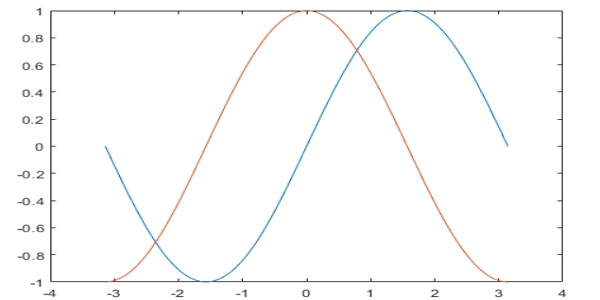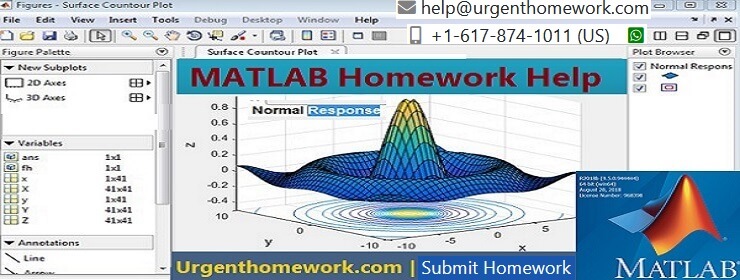MATLAB Homework Help
Hire Online Matlab Homework Help Professionals to boost your Grades
- MATLAB has the ability to read in various common as well as domain-specific images.
- MATLAB can also be used for data analysis, statistics, and optimization.
- MATLAB also has the ability to generate C code which can, later on, be used to run on embedded systems and other operating devices.
Disadvantages of MATLAB by Matlab Assignment Help Experts
- A large amount of memory is used in accordance with the matrix library.
- The amount of memory, in turn, decreases the speed of the computer system or whichever device is being used to store the program. Even the execution of the program is slower than other competitive languages in the industry.
- It takes up much more CPU time than it should ideally be allowed to take on. This makes the execution of real-time applications difficult and complicated on the device.
- For a beginner, MATLAB can be termed excessively expensive.
Applications of MATLAB
- Working with linear algebra is possible while using MATLAB.
- It used in the programming industry for performing numerical analysis.
- MATLAB is also used for research applications.
- The real-world simulation uses MATLAB for its development and execution processes. This new technology reforms the uses of MATLAB in a refreshing way.
- The matrix laboratory is also used for image processing.
Professional MATLAB Homework Help by the Experts
MATLAB is a numeric programming language and that makes it one of a kind. It works on a completely different syntax and still used in many applications. If you are a programming geek, you would love to try out this fundamental and unique approach towards numerical computing.
Also, if you are planning to build a career in web designing or anything else that deals with a lot of images, you will be required to learn using MATLAB since it is one of the crucial components. If you are interested in creating video games and would like to go in that field, then MATLAB is a must because real-world simulation uses MATLAB to a very large extent.
Matlab File extensions for MATLAB Homework Helpers
Matlab
.fig - MATLAB figure
.m - Matlab code (function, script, or class)
.mat - Matlab data (binary file for storing variables)
.p - Matlab content-obscured .m file
.mlappinstall - Matlab packaged App Installer
We have professional tutors here who help the students with each and every query related to Matlab. The beauty of urgenthomework.com is we provide a separate tutor to each student which helps the student throughout the homework and assignment.
Sample MATLAB Assignment Help Code Solved By Expert
{`
clc
clear all;
c = 10^-4;
I1 = zeros(1,3) % Empty Vector to store current
I2 = zeros(1,3) % Empty Vector to store current
%i0=0;
t1 = 0:0.01:2;
t2 = 2:0.01:4;
for i= 1:length(t1)
I1(i)=15*c*(t1(i))^2
end
plot(t1,I1,'linewidth',3);
hold on
for i=1:length(t1)
I(i)=-15*c*(t2(i)-4)^2;
end
plot(t2,I2,'linewidth',3);
hold off
ylabel(' Current of the capacitor [A]');
xlabel('Time[s]');
`}
Sample Matlab Homework Help Output

Matlab (short for Matrix Laboratory) is a powerful software environment and programming language commonly used in various fields, including mathematics, engineering, physics, finance, and data analysis. Here are some common topics and areas of interest related to Matlab:
-
Matlab Basics:
- Understanding the Matlab environment, including the command window, workspace, and editor.
- Variables, data types, and basic operations.
- Writing and executing scripts and functions.
-
Matlab Graphics:
- Creating 2D and 3D plots.
- Customizing plot appearance, such as labels, legends, and titles.
- Animating plots and creating interactive visualizations.
-
Matlab Programming:
- Control structures (if-else statements, loops).
- Writing and debugging Matlab functions.
- Vectorization and efficient coding practices.
-
Linear Algebra and Matrix Operations:
- Matrix manipulation and operations.
- Solving linear systems of equations.
- Eigenvalues and eigenvectors.
-
Numerical Analysis:
- Root-finding methods (e.g., Newton-Raphson).
- Numerical integration and differentiation.
- Solving ordinary differential equations (ODEs).
-
Signal Processing:
- Filtering and smoothing signals.
- Fourier analysis and transforms.
- Wavelet analysis.
-
Image Processing:
- Basic image manipulation and processing.
- Image enhancement, filtering, and restoration.
- Object detection and recognition.
-
Machine Learning and Deep Learning with Matlab:
- Using built-in functions for machine learning.
- Implementing neural networks and deep learning models.
- Image recognition and classification.
-
Simulink:
- Creating and simulating dynamic systems and control models.
- Model-based design and simulation.
-
Data Analysis and Statistics:
- Data import and export.
- Statistical analysis and hypothesis testing.
- Time series analysis.
-
Optimization:
- Linear programming.
- Non-linear optimization.
- Genetic algorithms and particle swarm optimization.
-
GUI Development:
- Building graphical user interfaces for Matlab applications.
- Utilizing the MATLAB App Designer.
-
Parallel Computing and GPU Acceleration:
- Leveraging multiple CPU cores and GPUs for faster computations.
- Parallel programming with MATLAB.
-
MATLAB Toolboxes:
- Utilizing specialized toolboxes (e.g., Statistics and Machine Learning Toolbox, Image Processing Toolbox) for domain-specific tasks.
-
Application-specific Topics:
- Depending on your field, you might delve into specialized topics like control systems, robotics, finance modeling, or bioinformatics using Matlab.
-
Best Practices:
- Code optimization and profiling.
- Documentation and version control.
- Debugging techniques.
-
Integration with External Software:
- Interfacing Matlab with other programming languages (e.g., C++, Python).
- Importing and exporting data from/to various file formats.
-
Simulations and Modeling:
- Building mathematical models and conducting simulations for scientific and engineering problems.
-
Mathematical and Statistical Analysis:
- Advanced mathematical and statistical analysis, including symbolic mathematics.
-
Data Visualization:
- Creating custom data visualizations using Matlab's plotting capabilities
Programming Topics
- Ada
- Assembly Language
- AutoCAD
- BASIC
- Computer virus
- C Programming
- Euphoria
- Fortran Homework Help
- Game programming language
- Java Assignment Help
- JavaScript
- Java Servlets Help
- Machine Language
- Matlab
- Pascal
- Perl
- PHP
- Python
- Ruby
- Servlet Life Cycle
- Smalltalk
- SOAP
- Visual Basic
- COBOL
- Lisp
- Logo Help
- Plankalkul Help
- Prolog
- REBOL
- Rexx
- Scheme Help
- TCL
- ToonTalk Help



